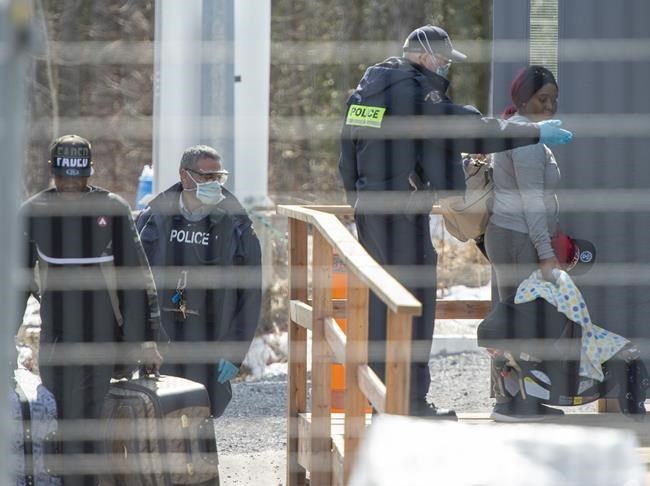MONTREAL — Quebec is asking the federal government to close a popular, unofficial border crossing south of Montreal because the province can't handle the number of asylum seekers entering the country, but refugee advocates are rejecting Quebec's claims.
More than 100 refugee claimants are entering Quebec every day from the United States through a rural path called Roxham Road, Premier François Legault told reporters Wednesday.
"It's unacceptable," Legault said at the legislature. "It's impossible because we don't have the capacity."
The federal government takes 14 months to study an asylum claim and in the meantime, Quebec has to house and care for would-be refugees and school their children, the premier said.
"We cannot afford to give services," Legault said, adding that if the current pace continues, Quebec will not have adequate housing for 36,000 new arrivals.
Refugee advocates, however, say they don't accept the premier's claim.
"What is Quebec's capacity for compassion? For justice? It's maybe not unlimited, but the capacity is there," Paul Clarke, interim executive director of Action Réfugiés Montréal, said Wednesday in an interview.
Clarke, whose group sponsors and offers services to refugees, said that while it can be difficult for asylum seekers to find shelter in Montreal, he doesn't think the situation is any better in other Canadian cities.
Janet Dench, executive director of the Canadian Council for Refugees, said that many people who had crossed the border at Roxham Road found work in Quebec's long-term care homes during the pandemic.
"We not only have the capacity, but we also have the need, in fact, for more people," she said in an interview Wednesday.
Part of the problem, she said, is the length of time it takes the federal government to issue work permits to asylum seekers.
"The federal government could alleviate things tremendously simply by giving work permits shortly after people arrive, so that they can get to work, and there are many jobs that they could very usefully fill," Dench said.
In Montreal, 1,049 refugee claimants are currently staying at shelters run by a regional health authority program that has room for around 1,150 people.
"We are busy but the situation is stable," Carl Thériault, a spokesman for the regional health authority in west central Montreal, wrote in an email Wednesday.
The irregular border crossing at Roxham Road reopened in November after it was closed during the pandemic. Since the beginning of the year, the RCMP have intercepted 7,013 asylum seekers who have crossed irregularly into Quebec from the U.S. That number is up from 4,246 last year.
In 2019, more than 16,000 asylum seekers were intercepted by the RCMP after crossing irregularly into Quebec.
Legault said many of those who cross irregularly are ultimately not able to stay in Canada.
"You have to understand, the problem is that many of these people are not really refugees," the premier said. "A refugee is someone who is physically at risk in their country. But the majority are not refugees; eventually, when the file is analyzed, they are refused, returned back home."
Clarke said it's not possible to determine which refugee claimants will be successful. "To say half of these people aren't going to make it, well, which half, Mr. Legault?" he said.
"If he's saying that, then he is acknowledging that people are coming to Canada and they do need protection. So how do you figure out which half?"
Under the 2004 Canada—United States Safe Third Country Agreement, refugee claimants who enter Canada outside an official port of entry must be processed in Canada and cannot be immediately returned to the U.S. Claimants who come through official points of entry, however, are sent back to the U.S.
Dench said closing the Roxham Road entry point would merely push people to cross elsewhere — which would make it more difficult for the federal government to process asylum seekers.
"The reason they're concentrated in Quebec is simply a matter of geography, because there is a large land border between the U.S. and Canada that people can cross over," Dench said, adding that many asylum seekers leave Quebec for other provinces while they wait for their claims to be processed.
Federal Public Safety Minister Marco Mendicino told reporters Tuesday that a balance needs to be found.
"Resources have been provided for that particular issue at the border," he said. "We are also in discussions with the U.S. to regulate the movements of any asylum seekers. This is part of the strategy in order to both defend the rights of refugees while at the same time protecting Quebec citizens."
Asked about the negotiations with the U.S. later on Wednesday, Prime Minister Justin Trudeau told reporters “we will always continue to respect the principles of our immigration system. We have a rigorous system that will continue to do its work."
This report by The Canadian Press was first published May 11, 2022.
— With files from Sidhartha Banerjee in Montreal and Jim Bronskill and Michel Saba in Ottawa.
Jacob Serebrin, The Canadian Press



